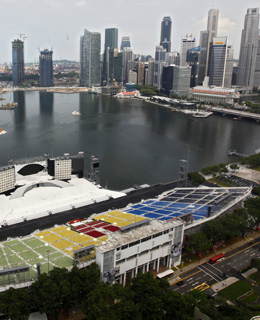
General view of the hotel towers of the Marina Bay Sands Integrated Casino Resort (Left) and the financial district skyline (Right) in Singapore, 08 July 2009.
(2 of 2)
One of these is the Professional Couriers, an Indian parcel service that has made Singapore its Southeast Asia logistics hub. A blue chip it isn't. But what the company lacks in gravitas it makes up for in entrepreneurial energy. "More Indian companies want to develop a global footprint and it's much easier to do that from Singapore," says Pradeep Menon, chief executive of the Singapore Indian Chamber of Commerce, citing the island's superior air and telecommunications links to the rest of Asia and its advantages as a financial hub.
Singapore's tiny size (2008 pop. 4.84 million) has traditionally been its greatest economic vulnerability. Add to that an almost complete absence of natural resources, and Singapore was left little choice but to trade its way to prosperity — a realization its first Prime Minister, Lee Kuan Yew, came to as far back as the late 1960s, when a commitment to free trade was unfashionable in the developing world.
But after more than four decades of trade-driven growth, Singapore has found that its relatively wealthy citizens can now help to provide the economic cushion it lacked at its independence in 1965. According to Singapore's Department of Statistics, the average income per working household member has grown 5.5% over the past three years, to $1,652 a month or roughly $20,000 a year. A stunning 84% of Singapore's citizens live in subsidized public-housing estates, which keeps the cost of living and mortgages low. And because most large Singapore companies have so far refrained from mass layoffs, unemployment in Singapore, at just 3.3%, remains enviably low. Citigroup's Kit points out that though 18,600 jobs were lost in Singapore in the first half of 2009, that's less than half the the number lost at similar stages of recessions in 1997 and 2001.
That's why, despite the recession, ordinary Singaporeans have more cash in their pockets to spend than debt-burdened Americans or jobless Europeans. Inside the Harry Winston luxury-jewelry store in a mall on Orchard Road, a pear-shaped $5.3 million diamond ring has been pulling customers through the shop's bulletproof doors. Although nobody has yet snapped up the ring, Ginny Ng, managing director of Harry Winston in Singapore, says with a shrug, "I don't feel the global recession here."
Singaporeans have also continued to spend because they still feel like they are getting ahead in the world rather than losing ground. According to Citigroup, the total value of assets held by the average household has increased by almost 60% since 2000 despite the recent downturn. "Singapore households have always had a strong balance sheet, but what they lacked before was confidence," says Mark Matthews, chief strategist for Asia at Fox-Pitt Kelton Securities in Hong Kong. "Now they are confident."
To be sure, Singapore can't isolate itself from the economies of the U.S. and Europe and expect to prosper. The sea lanes around Singapore, once dotted with three-masted clippers bearing tea and silver, and crowded today with oil tankers and container vessels, will be as vital to Singapore's economic future as they have been for its past. "We have to export," says Banerjee of PricewaterhouseCoopers. But by shifting its nautical gaze from West to East, as well as looking inward, Singapore may be charting a new economic course for the rest of Asia.